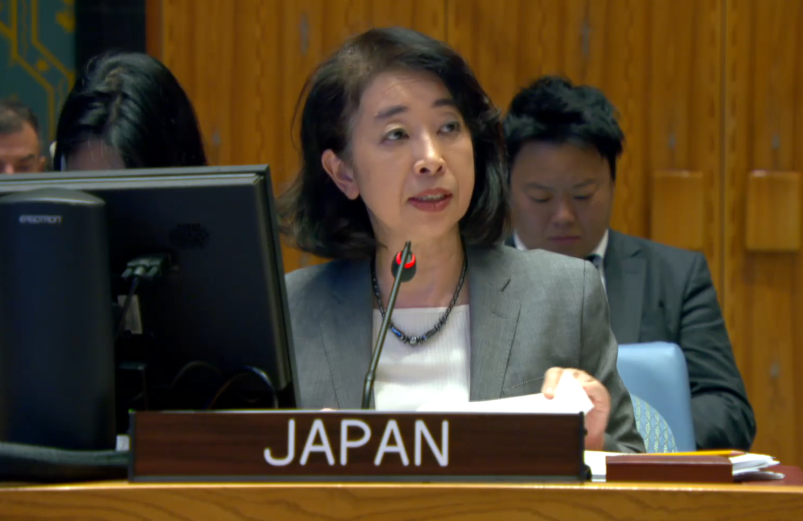コロンビアに関する安保理会合における志野大使ステートメント
令和5年10月11日

(As delivered)
Thank you, Mr. President.
I thank SRSG Mr. Ruiz Massieu and Mr. Botero for their briefings. I welcome Foreign Minister Leyva who joined this meeting. And I also thank Mr. Curić Hrvatinić, for the advice from the PBC. We appreciate it very much.
Mr. President,
Japan welcomes the efforts of the Colombian Government in advancing the peace process and commends the United Nations Verification Mission in Colombia (UNVMC) for their support in this endeavour.
The upcoming department and municipal elections will be a significant opportunity for Colombia to validate the achievements stemming from its longstanding commitment to peace. The Security Council and the international community will be following closely and with keen interest. Japan continues to emphasize the importance of conducting elections in an atmosphere free of violence. This requires leadership by the Colombian Government and active cooperation by the Colombian people.
Creating and maintaining an atmosphere free of violence should extend beyond the elections. The immediate cessation by all actors of any forms of violence, including against civilians and former combatants, is vital.
In this regard, Japan commends the Columbian Government’s efforts to implement the Final Peace Agreement and looks forward to further efforts to implement the National Plans for Rural Reform, as well as the first issuances of restorative sentences in the Special Jurisdiction for Peace (SJP).
We also welcome the continued dialogue between the Government and several armed groups under the Total Peace Policy, including the EMC FARC-EP and the fourth round of talks with the Ejército de Liberación Nacional (ELN).
Any ceasefire talks or agreements need to be sustained by concrete action. Unfortunately, several previous ceasefire agreements have broken in the past. An institution-based approach is one way to ensure that ceasefire agreements are sustainable. The National Participation Committee (NPC), which the PBF is supporting, could be a part of such a mechanism.
A necessary thread for all phases of a ceasefire to succeed is the full and meaningful participation. As the PBC Chair noted, measures and frameworks that protect and promote people, including women and youth, to actively engage on the ground in peacebuilding efforts, are crucial.
In closing, Mr. President, Japan reaffirms its continuous support for Colombia's peace efforts.
I thank you.
I thank SRSG Mr. Ruiz Massieu and Mr. Botero for their briefings. I welcome Foreign Minister Leyva who joined this meeting. And I also thank Mr. Curić Hrvatinić, for the advice from the PBC. We appreciate it very much.
Mr. President,
Japan welcomes the efforts of the Colombian Government in advancing the peace process and commends the United Nations Verification Mission in Colombia (UNVMC) for their support in this endeavour.
The upcoming department and municipal elections will be a significant opportunity for Colombia to validate the achievements stemming from its longstanding commitment to peace. The Security Council and the international community will be following closely and with keen interest. Japan continues to emphasize the importance of conducting elections in an atmosphere free of violence. This requires leadership by the Colombian Government and active cooperation by the Colombian people.
Creating and maintaining an atmosphere free of violence should extend beyond the elections. The immediate cessation by all actors of any forms of violence, including against civilians and former combatants, is vital.
In this regard, Japan commends the Columbian Government’s efforts to implement the Final Peace Agreement and looks forward to further efforts to implement the National Plans for Rural Reform, as well as the first issuances of restorative sentences in the Special Jurisdiction for Peace (SJP).
We also welcome the continued dialogue between the Government and several armed groups under the Total Peace Policy, including the EMC FARC-EP and the fourth round of talks with the Ejército de Liberación Nacional (ELN).
Any ceasefire talks or agreements need to be sustained by concrete action. Unfortunately, several previous ceasefire agreements have broken in the past. An institution-based approach is one way to ensure that ceasefire agreements are sustainable. The National Participation Committee (NPC), which the PBF is supporting, could be a part of such a mechanism.
A necessary thread for all phases of a ceasefire to succeed is the full and meaningful participation. As the PBC Chair noted, measures and frameworks that protect and promote people, including women and youth, to actively engage on the ground in peacebuilding efforts, are crucial.
In closing, Mr. President, Japan reaffirms its continuous support for Colombia's peace efforts.
I thank you.
